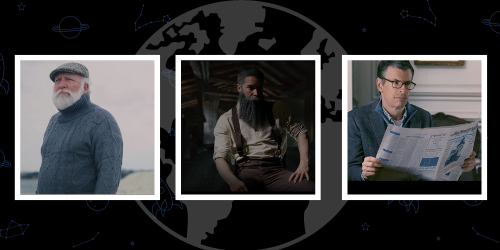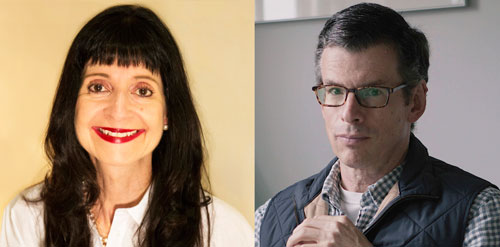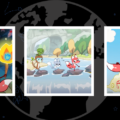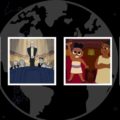This month, audiences can screen Fish Tale on the Planet Classroom Network. This film is curated for the Planet Classroom Network by KIDS FIRST! Film Festival.
Fish Tale from Director Mark Kiefer is a witty short film that imagines a fictional conversation between two of literature’s greatest writers, Ernest Hemingway and Herman Melville. In our interview which follows with Mark, we delve into the captivating world of his film, Fish Tale. A masterful blend of comedy, revisionist history, and literary exploration, Fish Tale invites audiences on a whimsical journey that imagines the return of Ernest Hemingway as a ghost. Discover the inspirations, creative processes, and unique elements that shape this thought-provoking cinematic experience.
The Global Search for Education is pleased to welcome Mark Kiefer.
Mark, what inspired you to create a film that explores the possibility of Ernest Hemingway’s return as a ghost? Were there any specific literary works or events that influenced the story?
Fish Tale is a sequel of sorts to an earlier short film we had made with the same actors – Eddie Nason and Jack Bulger. The earlier film imagined how the American edition of Moby Dick got its much longer and more awkward full title, Moby Dick; Or, The Whale, which we also shot on Nantucket Island. As an adult, I read Moby Dick and was quite taken by it. However, as a child, my mother used to read Hemingway’s The Old Man and the Sea to us aloud every summer at our cottage on Cape Cod. It occurred to me that the two books essentially tell the same story – an old man obsessed with a giant fish – but with a stark contrast in style. Melville’s writing is almost impossibly dense, while Hemingway’s is the epitome of minimalism. I thought this contrast could create excellent comedy. Furthermore, I discovered that Hemingway’s visit to Nantucket as a child had inspired his writing career, which provided a basis for how the two writers might ultimately meet.
Comedy and revisionist history are two elements that play a significant role in Fish Tale. Can you talk about your approach to balancing these two elements and creating a cohesive narrative?
I think a lot of comedy comes from re-examining things that we’ve long taken for granted through a fresh or different lens. Ultimately, what makes things funny is the same thing that makes things dramatic: conflict. So, I thought it would be fun to re-examine one of my favorite books from one of my favorite authors, Hemingway’s The Old Man and The Sea, by asking, ‘What would Herman Melville think of it?’ He died before Hemingway was born. He might, like me, think it a masterpiece, but he might also recognize his own story in it, which he might understandably find outrageous. He could certainly feel both of those things, and I thought the working out of those seemingly contradictory but very human feelings would make for an interesting story.
The film features an argument between Ernest Hemingway and Herman Melville. How did you approach writing the dialogue for this scene and what was your process for casting actors to portray these iconic literary figures?
The central conflict in this scene revolves around the tension between the notion that ‘nothing is original’ and the two authors’ starkly different writing styles. So, I knew it ultimately had to be about the philosophical question of what really makes the story—is it the ‘what’ or the ‘how’—and I thought it would be interesting to have our characters hash that out. Eddie Nason had played Melville in our earlier Moby Dick-inspired short film called Or, The Whale. He looks a lot like Melville and also has a similar temperament, so he was a natural, as they say. Jack Bulger had played the publisher James Harper in Or, The Whale, and he’s also quite similar in both age and appearance to Hemingway at the time of his death, so he was likewise a natural choice for that role.
Fish Tale has a unique and surreal feel to it, with scenes taking place in an attic and characters engaging in a near-fistfight. Can you discuss your approach to creating a distinct visual style for the film and how it enhances the story?
In the visuals, I wanted to capture the essence of Nantucket, a place that’s both old and timeless, while also differentiating the ghosts from the other characters by creating a clear visual division between the two worlds. The downstairs world of the living room, aptly named in this case, is bright, comfortable, and ‘lived in,’ contrasting with the dark, mysterious, and empty attic world of the ghosts. The ferry boat, which we see at the beginning and the end of the story, carrying the ghosts, has long been a visual metaphor for the crossing between the worlds of the living and the dead, as famously depicted in Greek mythology. When we first meet Hemingway, he’s alone on the ferry deck, providing the initial hint that he’s a ghost. At the beginning, we see a lighthouse—a metaphorical symbol—behind Hemingway, and then again from the deck of the ferry at the end, with its light now illuminated, symbolizing that the characters have gained wisdom from their experience.
Thank you Mark!
C. M. Rubin and Mark Kiefer
Don’t miss Fish Tale, now streaming on the Planet Classroom Network. This film is curated for the Planet Classroom Network by KIDS FIRST! Film Festival.







Recent Comments